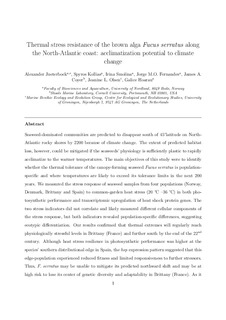| dc.contributor.author | Jüterbock, Alexander | |
| dc.contributor.author | Kollias, Spyros | |
| dc.contributor.author | Smolina, Irina | |
| dc.contributor.author | Fernandes, Jorge M.O. | |
| dc.contributor.author | Coyer, James A. | |
| dc.contributor.author | Olsen, Jeanine L. | |
| dc.contributor.author | Hoarau, Galice Guillaume | |
| dc.date.accessioned | 2015-03-24T15:12:42Z | |
| dc.date.accessioned | 2015-03-28T12:24:30Z | |
| dc.date.available | 2015-03-24T15:12:42Z | |
| dc.date.available | 2015-03-28T12:24:30Z | |
| dc.date.issued | 2014 | |
| dc.identifier.citation | Jüterbock, A., Kollias, S., Smolina, I., Fernandes, J.M.O., Coyer, J.A., Olsen, J.L. & Hoarau, G.G. (2014). Thermal stress resistance of the brown alga Fucus serratus along the North-Atlantic coast: acclimatization potential to climate change. Marine Genomics, 13, 27-36. doi: | nb_NO |
| dc.identifier.issn | 1876-7478 | |
| dc.identifier.uri | http://hdl.handle.net/11250/280367 | |
| dc.description | Author's accepted version (post-print). | |
| dc.description | NOTICE: this is the author’s version of a work that was accepted for publication in Marine Genomics. Changes resulting from the publishing process, such as peer review, editing, corrections, structural formatting, and other quality control mechanisms may not be reflected in this document. Changes may have been made to this work since it was submitted for publication. A definitive version was subsequently published in Marine Genomics (2014), 13. doi: http://dx.doi.org/10.1016/j.margen.2013.12.008. | |
| dc.description.abstract | Seaweed-dominated communities are predicted to disappear south of 45° latitude on North-Atlantic rocky shores by 2200 because of climate change. The extent of predicted habitat loss, however, could be mitigated if the seaweeds' physiology is sufficiently plastic to rapidly acclimatize to the warmer temperatures. The main objectives of this study were to identify whether the thermal tolerance of the canopy-forming seaweed Fucus serratus is population-specific and where temperatures are likely to exceed its tolerance limits in the next 200 years. We measured the stress response of seaweed samples from four populations (Norway, Denmark, Brittany and Spain) to common-garden heat stress (20 °C–36 °C) in both photosynthetic performance and transcriptomic upregulation of heat shock protein genes. The two stress indicators did not correlate and likely measured different cellular components of the stress response, but both indicators revealed population-specific differences, suggesting ecotypic differentiation. Our results confirmed that thermal extremes will regularly reach physiologically stressful levels in Brittany (France) and further south by the end of the 22nd century. Although heat stress resilience in photosynthetic performance was higher at the species' southern distributional edge in Spain, the hsp expression pattern suggested that this edge-population experienced reduced fitness and limited responsiveness to further stressors. Thus, F. serratus may be unable to mitigate its predicted northward shift and may be at high risk to lose its center of genetic diversity and adaptability in Brittany (France). As it is an important intertidal key species, the disappearance of this seaweed will likely trigger major ecological changes in the entire associated ecosystem. | nb_NO |
| dc.language.iso | eng | nb_NO |
| dc.publisher | Elsevier | nb_NO |
| dc.title | Thermal stress resistance of the brown alga Fucus serratus along the North-Atlantic coast : acclimatization potential to climate change | nb_NO |
| dc.type | Journal article | nb_NO |
| dc.type | Peer reviewed | nb_NO |
| dc.date.updated | 2015-03-24T15:12:42Z | |
| dc.subject.nsi | VDP::Mathematics and natural science: 400::Zoology and botany: 480::Marine biology: 497 | nb_NO |
| dc.source.pagenumber | 27-36 | nb_NO |
| dc.source.volume | 13 | nb_NO |
| dc.source.journal | Marine Genomics | nb_NO |
| dc.identifier.doi | 10.1016/j.margen.2013.12.008 | |
| dc.identifier.cristin | 1127972 | |
